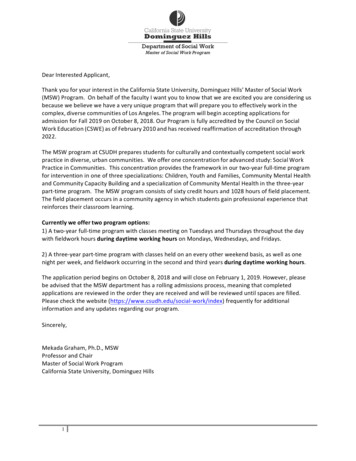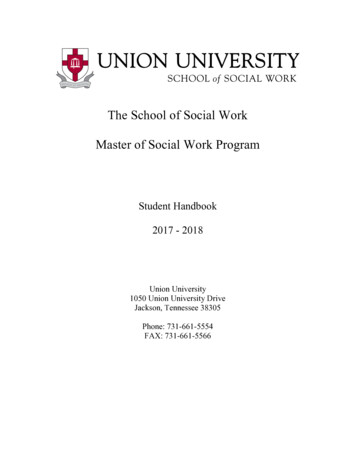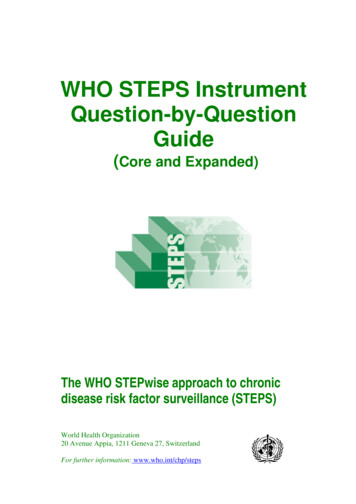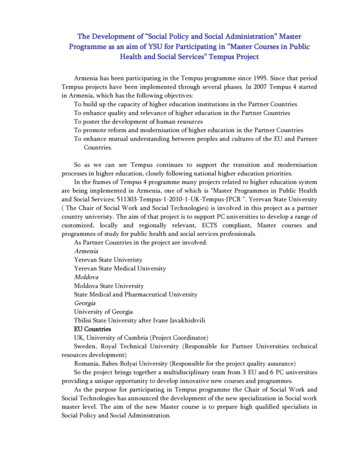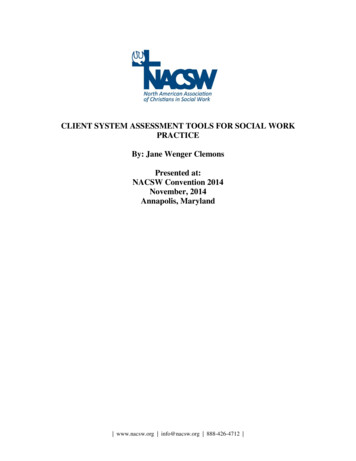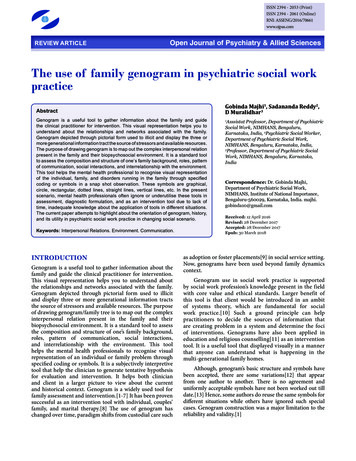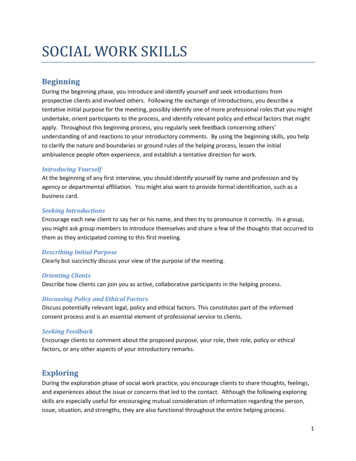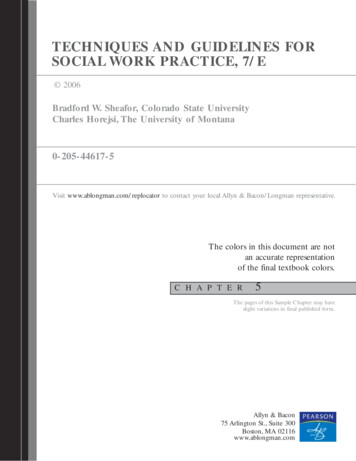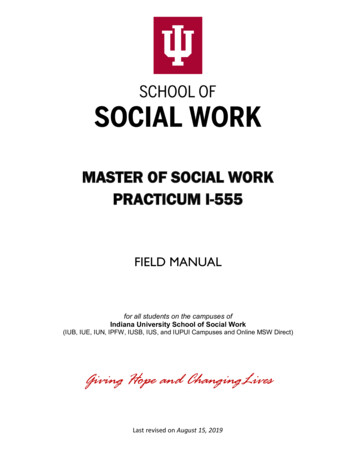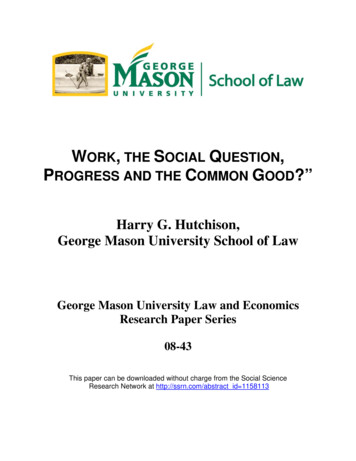
Transcription
WORK, THE SOCIAL QUESTION,PROGRESS AND THE COMMON GOOD?”Harry G. Hutchison,George Mason University School of LawGeorge Mason University Law and EconomicsResearch Paper Series08-43This paper can be downloaded without charge from the Social ScienceResearch Network at http://ssrn.com/abstract id 1158113
Draft of July 10, 2008Word count: 21,318Work, the Social Question, Progress and the Common Good?Harry G. Hutchison*Review Essay:Recovering Self‐Evident Truths: Catholic Perspectives on American Law, edited by MichaelA. Scaperlanda & Teresa Stanton Collett,(Catholic University Press, 2007).AbstractIn Recovering Self‐Evident Truths: Catholic Perspectives on American Law, editorsMichael A. Scaperlanda and Teresa Stanton Collett offer a collection of essays thatrevive the connections between faith and reason and between truth and hope as thefoundation for progress. Given the importance of papal encyclicals, work, and theincreasing demands of the regulatory state, this article concentrates on three central andrelated themes that surface throughout the book: the difficulty, in America’s currentepoch, of acknowledging any shared truths, the question of labor and employmentpolicy in a pluralistic society, and the relative balance needed between stateintervention on the one hand and voluntary associations, properly‐formed communitiesand individual autonomy, on the other. Ultimately, these themes give rise to afundamental question: can liberalism be coherently conceived within parametersprovided by Catholic social thought?Scaperlanda and Collett’s enterprise, featuring more than a dozen authors, is heldtogether by the authors’ persistence in pursuing objective truth as the criterion ofjudgment. Objective truth may be in conflict with the concept of pluralism, whichdeclines to concede that rights necessarily have a moral footing rooted in truth.Moreover, government officials, who wield state power, ostensibly to achieve thecommon good and to secure moral and economic progress, may have an interest indenying the truth. President Franklin Delano Roosevelt’s New Deal illustrates thispossibility. Seeking moral and social progress, the book concentrates on Catholicanthropology, “which should equip Catholic legal thought for dialogue with seculardisciplines and secular culture by opening up a space of truth in what is common toall.” Regardless of how attractive this move may be, complications surface.It is not clear whether or not the United States can provide an environment, wheresociety can move toward a shared understanding of justice, progress and the commongood. If not, can self‐evident truths receive an adequate hearing in a society in whichindividuals are disoriented by endless possibilities offered by postmodernism? I argue1
that the book, Recovering Self‐Evident Truths: Catholic Perspective on American Law can bea source of progress toward a proper account of the common good if American societyaccepts two observations: (1) law, as a coercive force, cannot fully fashion change withinthe human person, and (2) the correctness of Pope John Paul II’s assertion thatstructural transformation of society is secondary to moral renovation.Table of ContentsPageI. Introduction. . . . . . . . . . . . . . . . . . . . . . . . . . . . . . . . . . . . . . . . . . . . . . . . . . . . . 2II. Does Catholic Legal Theory Supply Coherent Truth to America? . . . . . . 17A. Finding Truth in the Nature of the Human Person inCommunity. . . . . . . . . . . . . . . . . . . . . . . . . . . . . . . . . . . . . . . . . . . . . . 17B. Finding the Common Good or Finding Conflict? . . . . . . . . . . . . . 41III. Work, the Social Question and the New Deal. . . . . . . . . . . . . . . . . . . . . . . . 57A. The New Deal: A Catholic Conception of theCommon Good? . . . . . . . . . . . . . . . . . . . . . . . . . . . . . . . . . . . . . . . . 57B. The New Deal as a Paragon of Progress? . . . . . . . . . . . . . . . . . . . . 60C. Pursuing Progress Within and Beyond theCentralizing State. . . . . . . . . . . . . . . . . . . . . . . . . . . . . . . . . . . . . . . . 76IV. Conclusion . . . . . . . . . . . . . . . . . . . . . . . . . . . . . . . . . . . . . . . . . . . . . . . . . . . . . 81I. IntroductionThe pursuit of the common good has been an important topic throughoutAmerican history. Several conceptions of the common good (perhaps conflicting)sparked the Revolutionary War, the nation’s founding documents and the formation ofthe United States. Developing a proper conception of the common good has been a taskthat has bedeviled countless scholars, theologians and the nation’s founders. Achievingthe common good has proved to be even more elusive.2
The Declaration of Independence is a political document meant to secure certainself‐evident truths and political goods for many, but not necessarily all of the populace. 1The Declaration is framed in largely moral tones that resonated with a people who, atthe time of its inception, had learned political and moral philosophy, if only indirectly,from John Locke and Pierre Bayle’s teaching on the necessity of freedom of conscience. 2While Locke asserts that a state that does not respect rights is acting beyond its properpower and imposes no duty of obedience, 3 he appreciates the possibility that “rightstend not to ‘government and order . . . but anarchy and confusion.’” 4 Still, it is possibleto conclude that the Declaration implies, by linking human rights to the Creator, 5 thatrights, if they exist, originate outside of human experience.According to philosopher Chantal Delsol, rights standing alone are deeplyunsatisfying. She suggests that “[w]e now find ourselves in a society that is waiting, butdoes not know what it is waiting for. The feeling of being locked in implies the dreamof liberation and implies, too, the suspicion of something hidden beyond the confines of* Professor of Law, George Mason University School of Law. For helpful comments on earlier drafts, I am gratefulto: Elizabeth McKay, Helen Alvare′, Eric Claeys, John Dolan, David Gregory and Adam Mossoff. The usualdisclaimer applies. Research support was provided by the Law and Economics Center at George Mason UniversitySchool of Law. Harry G. Hutchison.1But see Abraham Lincoln, Speech at Springfield, Ill. (June 26, 1857), in THE COLLECTED WORKS OF ABRAHAMLINCOLN, 398, 405-6 (ed. Roy P. Basler, vol. 2, 1953) (arguing that the authors of the Declaration intended toinclude all even if it was obvious that all were not then actually enjoying equality).2See e.g., DAVID A. J. RICHARDS, TOLERATION AND THE CONSTITUTION 89-95 (1986) (“Locke and Bayle giveconscience a moral interpretation and weight associated with their conception of the proper respect due to thehighest-order interest of persons in their freedom.”) Id. at 90.3WILLIAM A. EDMUNDSON, AN INTRODUCTION TO RIGHTS, 30 (2004).4EDMUNDSON, supra note at 30 (discussing Locke).5See Declaration of Independence, (“We hold these truths to be self-evident, that all men are created equal, that theyare endowed by their Creator with certain unalienable Rights . . .”).3
daily life, however adequate daily life is claimed to be.” 6 Richard Swenson contendsthat because humans now live with unprecedented problems, we have beendisarticulated from our own past and do not know how to deal with the present, letalone the future. 7 Since the founding ideals of the American republic have beentransmuted into a collective and individual capitulation to radical human autonomy,human choice (both individually and collectively) may therefore promise meaning in alife that confronts endless possibilities and problems. 8 Against this backdrop, politicalsuccess may depend upon the reclamation of the moral high ground. 9 If true, therestoration of the idea of the common good to its proper place may issue forth in futurepolitical victories 10 and correlative human flourishing. Who could quibble with aphilosophical principle that urges citizens to look beyond their own self‐interest andinstead, work for the greater common interest as a solution to the evils, both intentionaland inadvertent, which afflict our land? 11Many problems both in our nation and in the world appear to be connected to theavailability and content of work and the disparities in power among individuals andgroups generated by ideological, economic and political conditions, which have6CHANTAL DELSOL, ICARUS FALLEN: THE SEARCH FOR MEANING IN AN UNCERTAIN WORLD, xxviii (2003). See also,Harry G. Hutchison, A Clearing in the Forest: Infusing the Labor Union Dues Dispute with First AmendmentValues, 14 WILLIAM & MARY, BILL OF RIGHTS J. 1309, 1311 (2006)[hereinafter, Hutchison, A Clearing in theForest].7RICHARD A. SWENSON, MARGIN: RESTORING, EMOTIONAL, PHYSICAL, FINANCIAL, AND TIME RESERVES TOOVERLOADED LIVES 41 (1992).8Id.9See e.g., Lew Daly, In Search of the Common Good: the Catholic roots of American Liberalism, BOSTON REVIEW,May/June (2007) at page 23.10Id.11Id.4
allowed injustices to persist or have created new ones. 12 Distinguished Catholic laborlaw scholar David Gregory illuminates the importance of work by emphasizing PopeJohn Paul II’s decision to make “Catholic social teaching on the rights of workers acentral theme of his pontificate, with the magnificent labor encyclicals Laborem Exercens,Solicitudo Rei Socialis, and Centesimus Annus.” 13 Centesimus Annus states that theChurch’s “teaching recognizes the legitimacy of workers’ effort to obtain full respect fortheir dignity and gain broader areas of participation in the life of industrial enterprisesso that, while cooperating with others and under the directors of others they can in acertain sense ‘work for themselves’ through the exercise of their intelligence andfreedom.” 14 Ignoring the problem of work and its accompanying regulation, as well asthe teachings embedded in papal encyclicals, may impair the nation’s capacity to attainthe common good.However, insisting that the attainment of the common good is a collective goalleads to two problems. First, achieving the common interest based simply on “faith inAmerica and its potential to do good” 15 is inadequate. 16 Instead, some observers areinclined to embrace Franklin Roosevelt’s contention “that democracy cannot livewithout that true religion which gives a nation a sense of justice and of moral12Laborem Exercens ¶ 8.David L. Gregory, Not the Bishops’ Finest Hour: Economic Justice, with Cerberus Unchained?, St. John’sUniversity, School of Law, Legal Studies Research Paper series, Paper #08-0119, available athttp://ssrn.com/abstract 1108151, 2 (March 2008).14Centesimus Annus ¶ 43.15Daly, supra note at 23.16Id.135
purpose.” 17 Consistent with this impulse, 18 during the 1930s some members of theCatholic press had little doubt that the New Deal’s vision of social justice was rooted inChristian thought. 19 At the same time, Commonweal magazine, a Catholic publication,urged readers to recognize that Roosevelt’s triumph in 1932 was “‘likewise the Catholicopportunity to make the teachings of Christ apply to the benefit of all.’” 20 Onecommentator insists that the New Deal was the first time in modern history where “aGovernment in any nation has set out to give practical application to the principles ofthe Sermon on the Mount.” 21 Congruent with the possibilities associated with therealization of secular salvation, the common good, as thus identified, materialized asnothing less than a rapturous epiphenomena.Second, the attempt to establish the common good occurs concurrently withexistence of intractable social problems, insofar as man is incapable of eliminating allforms of evil. These evils include death and disease, emotional and economic painborne by children and adults, and dysfunctional behavior by individuals, groups andnation‐states. Human attempts to eliminate affliction have troubled mankind wellbefore Thomas Aquinas wrote his great Summa Theologica, which included his discourseon the problem of evil. 22 Human knowledge and human capacity become visible as17Id.Id.19Id.20Id.21Id.22PETER KREEFT, FUNDAMENTALS OF THE FAITH: ESSAYS IN CHRISTIAN APOLOGETICS, 54 (1988).186
obvious shortcomings in attempts to eradicate malevolent activity from the face theearth. Understanding man’s inherent inability to solve all problems on terms that allwill consider just and good has sparked philosopher Peter Kreeft to exclaim that all ofus are ignorant. 23 No wonder Socrates interpreted the Delphic oracle’s declaration thathe was the wisest man in the world to mean that he alone knew that he did not havewisdom, and that was true wisdom for man. 24Given the limits of human wisdom, historic events come into view at inconvenientmoments. Francis Cardinal George argues that the “blow the Second World War dealtto humane ideals and values was so great” that a new start had to made wherein “afundamental legal structure was decided upon the basis of ‘responsibility beforeGod.’” 25 Thus, if human progress and the common good are to be achieved, or are evenachievable, they must rest on a sound foundation recalling FDR’s admonition thatdemocracy must reclaim true religion. Against this background, Michael A.Scaperlanda and Teresa Stanton Collett offer a series of essays in Recovering Self‐EvidentTruths: Catholic Perspectives on American Law 26 that revive the connections between faithand reason and between truth and hope as the foundation for progress.23Id. at 57.Id.25Francis Cardinal George, Foreword in RECOVERING SELF-EVIDENT TRUTHS: CATHOLIC PERSPECTIVES ONAMERICAN LAW, xi (eds. Michael A. Scaperlanda & Teresa Stanton Collett, 2007).26RECOVERING SELF-EVIDENT TRUTHS: CATHOLIC PERSPECTIVES ON AMERICAN LAW (eds. Michael A. Scaperlanda& Teresa Stanton Collett, 2007) [hereinafter, RECOVERING SELF-EVIDENT TRUTHS].247
Given the importance of work in papal encyclicals and the increasing demands ofthe regulatory state, this Essay concentrates on three central and related concerns thatsurface in Scaperlanda and Collett’s book: the difficulty of finding a basis foracknowledging any shared truths during America’s current epoch, the question of laborin a pluralistic society, and the relative balance between state intervention on the onehand, and voluntary associations, properly formed communities and individualautonomy on the other. Scaperlanda and Collett supply a multi‐layered corrective tothe current state of affairs by challenging critical assumptions including the prevailingview that moral reasoning must be separated from trenchant questions that plague lawand public policy. The editors and their colleagues offer legal theory and humanwisdom that “is deepened and anchored by the exposition of a Christiananthropology.” 27Despite their thorough attempt, difficulties haunt Scaperlanda and Collett’sventure. They concede that self‐evident truth can no longer be presumed, and thus theyask “how can ‘law’ be used as a tool to facilitate our ongoing experiment inrepresentative self‐governance in a country that seems to have lost its shared moralfoundation?” 28 Philosopher Alasdair McIntyre shows that during certain key episodesin history, philosophy fragmented and largely transformed morality. 29 Fragmentation27Cardinal George, supra note at xi-xii.Michael A. Scaperlanda and Teresa Stanton Collett, Introduction in RECOVERING SELF-EVIDENT TRUTHS 1, 2[hereinafter, Scaperlanda and Collett, Introduction].29Stanley Hauerwas, The Virtues of Alasdair MacIntyre, FIRST THINGS, 35, 36 (October, 2007).288
gave birth to Immanuel Kant and John Stuart Mill’s “attempt to develop accounts ofmorality in the name of some impersonal standard which was an understandableresponse to the loss of shared practices necessary for the discovery of goods incommon.” 30 Kant and Mill’s project is doomed to failure, however, exactly because nosuch standards can be sustained when they are abstracted from the practices anddescriptions that render our lives intelligible.” 31 Methodist theologian StanleyHauerwas explains that modern moral philosophy becomes part of the problem, as aresult of its stress on autonomy, like its corresponding attempt to free ethics fromhistory, because it “produces people, incapable of living lives that have narrativecoherence.” 32 Undaunted by MacIntyre’s work and Hauerwas’ analysis, Scaperlandaand Collett provide a double‐layered perspective on American law that is grounded inthe teaching of the Roman Catholic Church and is catholic in its claim that universaltruths are accessible to all through reason and experience. 33 Scaperlanda and Collettoffer the hypothesis that the American “Constitution was adopted by and for acommunity of persons with the purpose of securing the ‘Blessings of Liberty,’” 34arguing that the “Constitution itself places textual and structural limits on government,facilitating authentic freedom by creating room for civil society to work and flourish.” 3530Id.Id.32Id.33Scaperlanda & Collett, Introduction supra note at 2.34Id. at 3.35Id.319
Scaperlanda and Collett’s work delineates the claim that liberty and equality lie atthe core of our being and identity. 36 Uncertainties come into view on two planes. First,the editors admit that ordered liberty presents us as a paradox with the competingclaims of the individual, and the collective (the nation, society and government)requiring a criterion of judgment. 37 Second, they offer what may be an ultimatelyimpossible proposition: “We the people of the United States desire to promote orderedliberty in a pluralistic society that treats all persons as equals.” 38 The meaning of libertyhas been in conflict with equality and pluralism for some time. Since the “book isoffered in the spirit of strong pluralism,” 39 its approach raises the foundational questionwhether the volume can truly enter into a conversation with pluralists who reject thenotion of, and even the search for objective truth that is common to all. This is notsimply a new‐found conflict. Hugo Grotius, a sixteenth century Dutch philosopher,observes that there is no singular best life for people of all kinds to lead; therefore thereis no single best political state to facilitate such a life. 40 Pluralism, if combined with theidea that governments are essentially contracts among diverse peoples holding diverseviews of the good life, is a revolutionary notion 41 that may impair, rather than fortify,the concept of objective truth.36Id. 3-4.Id. at 4.38Id. at 4.39Id. at 8.40See e.g., WILLIAM A. EDMUNDSON, AN INTRODUCTION TO RIGHTS, 20 (2004) (discussing Grotius).41Id.3710
Scaperlanda and Collett’s enterprise is held together by the authors’ persistence inpursuing objective truth as the criterion of judgment. 42 Objective truth may be inconflict with the concept of pluralism, which declines to concede that rights necessarilyhave a moral footing rooted in truth. Government officials who seek to wield orincrease state power, ostensibly to achieve the common good, may have an interest indenying the truth. Nevertheless, consistent with the editors’ intuition, Francis CardinalGeorge states that Catholic anthropology elicits values, “which should equip Catholiclegal thought for dialogue with secular disciplines and secular culture by opening up aspace of truth in what is common to all.” 43The volume is anchored to the teaching of Pope John Paul II, but the editors’ searchfor objective truth provokes perplexing questions. For instance, can political liberalismbe squared with a principled understanding of Pope John Paul II’s doctrinalcontributions? Alternatively, can there be an effective Catholic contribution to thenation until there is again clarity about Catholic ways of living and thinking thatenables Catholic perspectives to alter lives in a meaningful way and win the war forAmerica’s soul? 44 After all an open debate has broken out among faithful Catholics overwhether popes and bishops can be infinitely permissive toward the freedom deman
WORK, THE SOCIAL QUESTION, PROGRESS AND THE COMMON GOOD?”. Harry G. Hutchison, George Mason University School of Law . George Mason University Law and Economics Research Paper Series . 08-43 . This paper can be downloaded without charge from the Social Science
